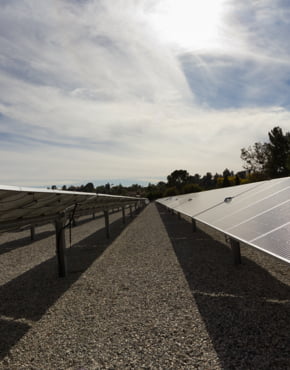Increased incentive goes into effect today, helps sectors comply with state mandate banning nonfunctional turf
Starting today, Southern California businesses and public agencies looking to replace ornamental grass with more sustainable landscaping can receive a larger rebate from the Metropolitan Water District of Southern California.
Thanks to a $30 million grant from the California Department of Water Resources, Metropolitan has added an additional dollar to its Turf Replacement Program base incentive – boosting it to $3 per square foot for commercial, industrial and institutional sectors and $4 for public agencies that swap out non-functional grass with California Friendly® and native landscaping.
“We’ve made huge gains in water-use efficiency in Southern California, and businesses and public agencies have the opportunity to help us further that progress,” said Metropolitan Interim General Manager Deven Upadhyay. “By switching to landscaping that is both beautiful and sustainable, they can help our region better adapt to our changing climate while cutting costs and demonstrating leadership in sustainability in their communities.”
The rebate also helps businesses and municipalities comply with Assembly Bill 1572, legislation co-sponsored by Metropolitan and signed into law by Gov. Gavin Newsom last year to phase out the use of potable water to irrigate non-functional turf or grass that is not used for recreation or other purposes, beginning in 2027.
Metropolitan’s Turf Replacement Program has directly resulted in the removal of over 220 million square feet of grass, saving enough water to serve about 68,000 households annually. In an effort to help expand the region’s tree canopy and promote sustainability, a new rebate launched earlier this year provides an additional $100 per tree that participants incorporate into their turf replacement projects. Some local water agencies may offer additional incentives.
Conservation programs play an important role in the region’s water supply reliability. Today, about 2.5 million acre-feet of the record 3.4 million acre-feet Metropolitan holds in regional storage is water that has been conserved and stored instead of being consumed. That conserved water has been instrumental in staving off additional and more widespread calls for mandatory water cutbacks had the stored reserves reached critically low levels during droughts over the past 20 years. (An acre-foot is nearly 326,000 gallons, equivalent to the amount of water used by three typical household in a year.)
“Every action Southern Californians take makes a difference,” said Krista Guerrero, Metropolitan resource specialist who manages the turf rebate program. “Whether it’s removing the portion of their turf they don’t use, installing a more efficient sprinkler system, or taking shorter showers, it all adds up to big savings.”
With a hotter, drier future in store, punctuated by extreme periods of drought and storms, Metropolitan is also engaging in a comprehensive planning process that accounts for those challenges. The Climate Adaptation Master Plan for Water (CAMP4W) process, currently underway, is a collaborative effort to create a roadmap for future capital investments and business decisions to adapt for a changed climate and its impact on water reliability.
For more information on Metropolitan’s conservation initiatives and rebate programs and to apply for a commercial, industrial, institutional or public agency rebate, visit bewaterwise.com.
The Metropolitan Water District of Southern California is a state-established cooperative that, along with its 26 cities and retail suppliers, provides water for 19 million people in six counties. The district imports water from the Colorado River and Northern California to supplement local supplies, and helps its members to develop increased water conservation, recycling, storage and other resource-management programs.
Media Contacts
